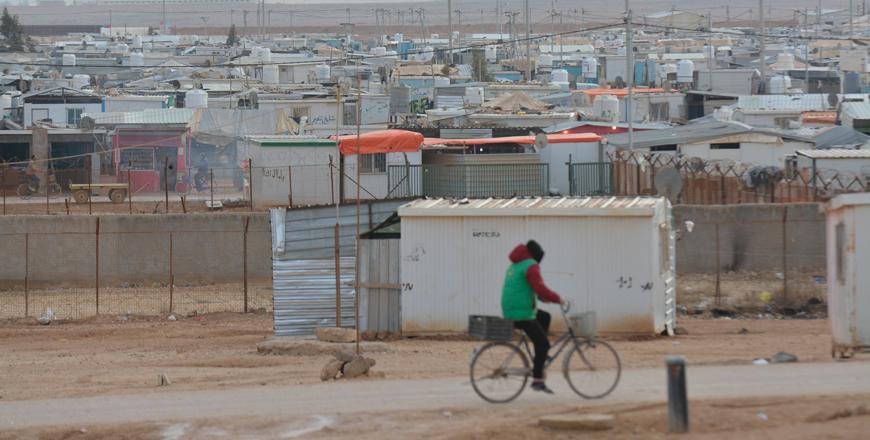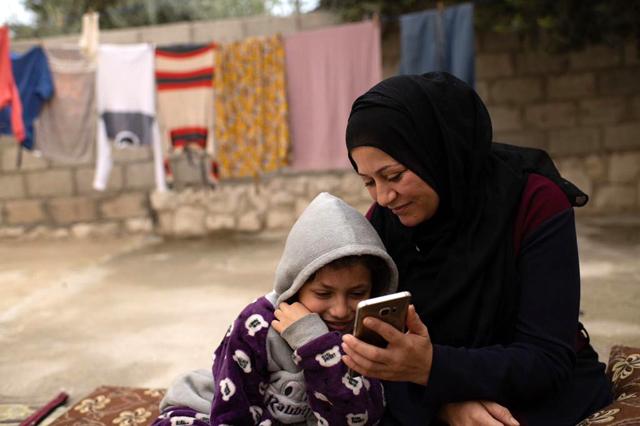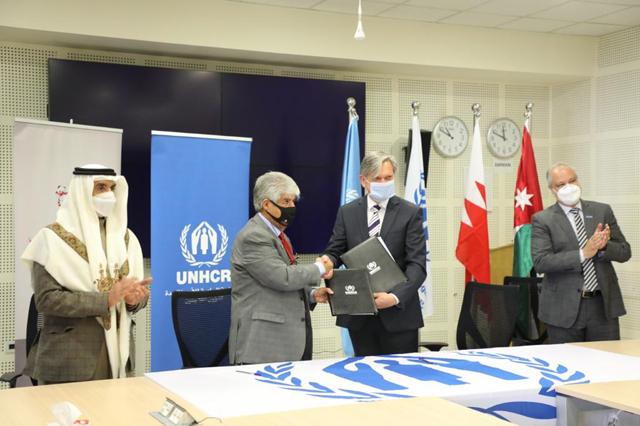You are here
12,000 refugee families on cash assistance waitlist as UNHCR faces funding shortage
By Batool Ghaith - Jul 31,2022 - Last updated at Jul 31,2022

A view of the Zaatari camp for Syrian refugees, some 90km northeast of Amman (Photo by Amjad Ghsoun)
AMMAN — Approximately 12,000 refugee families are on the cash assistance waitlist, meaning that they are eligible but unable to receive monthly cash assistance due to limited funding, according to UNHCR’s Operational Update report.
UNHCR, the UN Refugee Agency, provided cash assistance for about 33,000 refugee families in Jordan in June, including 3,000 non-Syrian families, the report said.
The report noted that UNHCR Jordan’s financial requirements in 2022 are $408 million, which is only 29 per cent funded ($119 million), as of July 5.
UNHCR, last week marked the 10th anniversary of the Zaatari camp, the temporary home to 80,000 Syrian refugees.
The agency expressed concern over the sustainability of the Zaatari camp, which began as a temporary facility 10 years ago, as the caravans, which replaced tents in 2013, have a normal life span of six to eight years meaning most of them are currently in need of urgent repair.
Roland Schonbauer, the UNHCR spokesperson, said: “Syrian refugees are also affected by the economic situation in Jordan, just like Jordanians.”
UNHCR is also assisting refugees in ways other than cash assistance, he said.
“We are trying to maintain the support from other countries and to engage with development agencies in order to achieve something more sustainable for refugees, which is our current prime goal to help the refugees get back on their feet to earn a living,” Schonbauer told The Jordan Times.
UNHCR is advocating for more economic opportunities in Zaatari, as it always had refugee entrepreneurship.
“UNHCR is supporting the economic independence of refugees in this regard and also highlighting that refugees can and want to make a contribution to the Jordanian economy,” he continued.
According to UNHCR, the Zaatari camp almost has 1,800 shops and businesses, refugee businesses employ an estimated 3,600 refugees and refugee entrepreneurs regularly engage with companies and clients in the nearby city of Mafraq.
There are employment centres in Zaatari and Azraq camps, Schonbauer said, noting that UNHCR facilitates the issuance of work permits in those centres in cooperation with the International Labour Organisation. In addition, the agency is also organising job fairs in camps so that the private sector can be there and to facilitate the selection of refugees, he said.
“UNHCR advocates for more sectors to be open for refugees, because if refugees are able to get back on their feet, it will reduce their dependency on humanitarian assistance,” he said.
According to UNHCR, the camp is now home to 32 schools, 58 community centres, and eight health facilities that operate alongside civil defence and community police.
In 2021 alone, over 7,000 refugees requested support for maintenance as roofs and windows cracked and walls warped, and the recent UNHCR’s Vulnerability Assessment Framework in 2022 showed that 70 per cent of wall conditions in Zaatari are considered “sub-standard”, said a UNHCR statement.
On the other hand, while a solar plant was opened to power the camp in 2017, its capacity was only able to meet the needs of all residents for 11.5 hours a day, and in recent months, electricity demand increased for summer, the agency said.
UNHCR has had to reduce the duration to only nine hours of power per day to be able to cope with the additional electricity costs incurred, as the solar plant does not provide for all the needs, according to the UNHCR statement.
“The solar plant is not big enough to deliver enough power to meet all the needs of refugees. This challenge is not uncommon in parallel structures such as camps. The better refugees are included in the country’s energy system, the better we can avoid such challenges, Schonbauer said.
UNHCR said that two-thirds of refugee families in the Zaatari camp say they are in debt and 92 per cent of families reported resorting to negative coping strategies such as reducing food intake or accepting high-risk jobs.
“On the 10-year anniversary of Zaatari camp in Jordan, UNHCR calls for the renewed commitment of all actors — development agencies, Jordanian authorities and humanitarians, with no immediate solution to the conflict in sight and humanitarian conditions deteriorating at a worrying pace, we need to work together to find long-term solutions for all Syrian refugees in Jordan and beyond, and to support their resilience until such solutions are found,” UNHCR Representative in Jordan Dominik Bartsch said in the statement.
Related Articles
AMMAN — UNHCR, the UN Refugee Agency, has distributed emergency cash assistance to approximately 39,000 refugee families in August to help t
AMMAN — As winter approaches, UNHCR, the UN Refugee Agency in Jordan, has started distributing one-off winter cash assistance for refugees a
AMMAN — UNHCR, the UN Refugee Agency signed a $1 million agreement with the Royal Humanitarian Foundation (RHF) of Bahrain to support Syrian


















